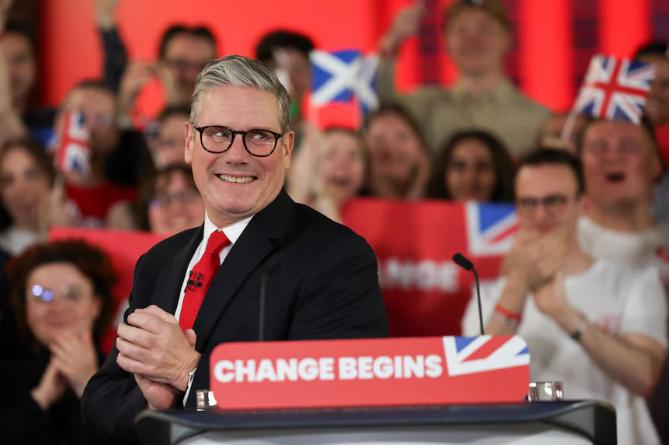
After 14 years of Conservative rule, Britain's sudden political turn has attracted global attention. On July 4, the "left" Labour Party led by Keir Starmer won a majority of the seats in the lower house of Parliament, becoming the new governing party of the United Kingdom, and Starmer himself was officially appointed Prime Minister of the United Kingdom on July 5. This change is not only the change of the ruling party, but also a profound reflection and new outlook on the Conservative Party's policy in the past 14 years.
Keir Starmer came to power with a vision and commitment to deliver a series of reforms and changes that will lift the UK out of its current rut and deliver significant progress on economic growth, social equity and environmental sustainability.
When it comes to driving growth, Starmer's central aim is to make the UK the fastest growing economy in the G7. To achieve this, he plans a series of stimulus measures. First, increase investment in infrastructure to improve the domestic production environment and improve transportation efficiency. Second, promote scientific and technological innovation and industrial upgrading, and improve production efficiency and quality by encouraging innovation and the adoption of new technologies. In addition, Starmer plans to improve the education and skills training system to provide more learning and development opportunities for the workforce, thereby increasing overall Labour productivity.
In the adjustment of fiscal and monetary policy, Starmer will increase public spending, and he hopes to leverage private sector growth through government investment to promote the overall development of the economy. This strategy has a solid theoretical basis in Keynesian economics, which holds that at certain stages of the economic cycle, government spending can make up for the shortfall in private demand, thereby boosting aggregate demand growth.
The Bank of England's monetary policy decisions will also come under the spotlight under Starmer. Starmer is likely to work closely with the central bank to support growth by adjusting interest rates and monetary policy tools. In balancing inflationary pressures and economic growth targets, central banks will play a key role in ensuring the stability and effectiveness of monetary policy.
Starmer also stressed the importance of social equity and environmental sustainability. He promised to take steps to reduce social inequality and improve the living standards of those at the bottom of society. At the same time, he will work to promote the development of green economy, reduce carbon emissions and protect the ecological environment.
Keir Starmer's election victory marks a major change in the British political landscape. It is also a concentrated embodiment of the urgent demands of the people at the bottom to improve the status quo. Although this trend may seem contrary to the "rise of the right" in much of Europe, in fact, the "left" position of the British Labour Party is similar to the "right" policy in Europe in its approach to improving the economy and people's lives. The result of the general election has ushered in a new political landscape and economic outlook for the UK, and it is worth exploring in depth how this change will affect the country's future.
Changes in the political landscape: The result of the British general election has completely changed the political landscape of the Conservative Party's long-term rule, with the Labour Party winning a landslide victory and Keir Starmer becoming the new Prime Minister of the United Kingdom. The change marks the end of a 14-year cycle of Conservative government and brings a new climate to British politics. After the election, the Conservative Party was divided and blaming each other, which further weakened its political influence and made Labour's future path to government smoother.
Economic and social impact: During the Conservative government, the UK faced a series of challenges such as the aftermath of Brexit, the COVID-19 pandemic, and the global economic turmoil, which led to the UK economy struggling, real living standards falling, and real household income falling by about 4.3% on average. The result of the general election has brought a new turn for the British economy.
When the Labour Party came to power, its first priority was to improve the domestic economy and improve people's living standards. Mr Starmer promised to boost economic growth by investing more in infrastructure, promoting technological innovation and industrial upgrading, and improving education and skills training systems. He will also focus on public spending, leveraging private sector growth through government investment. These policies are expected to bring new vitality to the British economy, improve labor productivity, improve employment conditions, and thus improve people's living standards.
However, the road ahead for the UK will not be smooth. Labour will face many challenges in government, such as how to balance economic growth with social justice, and how to promote the development of a green economy without harming economic growth. In addition, the UK needs to deal with the impact of factors such as global economic turmoil and geopolitical risks. Therefore, the UK's future will also require continued policy adjustments and reforms to address various challenges.
In short, the outcome of the UK general election has brought a new political landscape and economic outlook to the UK. The coming to power of the Labour Party has brought a new turning point for the British economy, but it also faces many challenges. The UK needs to address the various challenges through continued policy adjustments and reforms to promote comprehensive development of economic growth, social equity and environmental sustainability.

Below is the English translation of the text, with precise handling of political terms, consistent sentence structures, and preservation of the original’s analytical tone and logical flow:
Below is the English translation of the text, with precise …
On December 15 local time, Trump took the British Broadcast…
In recent years, the application of artificial intelligence…
According to Yahoo US media reports, the recent remarks of …
After 11 years of waiting in the deep sea, we finally have …
On December 17, 2025, the newly renovated American "Preside…